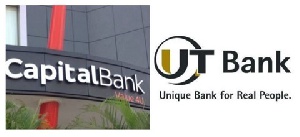 The two had their licenses revoked by the Bank of Ghana
The two had their licenses revoked by the Bank of Ghana
The talk of the Purchase and Assumption (P&A) transaction involving UT Bank and Capital Bank is thicker and has generated public discourse in the air now.
Some people are taking the opportunity to score political points whiles others are merely making social fun out of the whole transaction without taking time to understand the effect of the P & A transaction, what do such transaction mean to ordinary employees, the implication and consequences of the P & A transaction, whether this transaction is good or bad in the banking sector in Ghana.
On the 14 August, 2017- “The Bank of Ghana approved a Purchase and Assumption transaction with GCB Bank Ltd that transfers all deposits and selected assets of UT Bank Ltd and Capital Bank Ltd to GCB Bank Ltd. The Bank of Ghana has revoked the licenses of UT Bank Ltd and Capital Bank Ltd. This action has become necessary due to severe impairment of their capital”.
A receiver was then appointed to realised and settle the remaining assets and liabilities respectively. The transaction required that the main offices and branches of both preys will be subjected to the controls of the new Predator. It is imperative to note that the Bank of Ghana has assured the general public that, the transaction is to strengthen Ghana’s banking sector, ensure financial stability and protect depositors’ funds.
Now, what it does mean to say a bank is experiencing capital impairment and how does it occur? When the liquid assets are worthless than their stated value.
According to Section 28 of the Banks and Specialised Deposit Taking Institutions Act 2016, Act 930, a bank or specialised deposit-taking institution shall ensure that while in operation, it maintains in the country a minimum paid-up capital, unimpaired by losses including accumulating losses or other adjustments, as may be prescribed by the Bank of Ghana for banks and specialised deposit-taking institutions.
The Section 28(3) of Act 930 further stipulates that for the purpose of calculating impairment of paid-up capital, losses shall be set off in the following order:
(a) against income surplus and other distributable reserves excluding revaluation reserves; and
(b) against the Reserve Fund established under section 34 of Act 930.
The Section 33 of Act 930 prescribe the penalty for failing to meet the capital requirement to a point that if it persists, the Directors and the Chief Executive shall be personally liable to pay the Bank of Ghana an administrative penalty.
When a bank has impaired capital, this capital can be liquidated if the bank cannot make up the deficiency. In the case of a bank with impaired capital, one option for making up the deficiency is that the bank's board of directors can choose to levy and collect pro rata assessments on the shares to restore the impaired capital.
If the shareholders do not pay the assessments within a specified time frame, the bank's board of directors can choose to sell enough of the shareholder’s shares to collect the assessment.
The mandate of Banks under the Banks and Specialised Deposit Taking Institutions Act 2016, Act 930, Section 4(5) is taking money on deposit and making loans or other advances of money and financial activities prescribed by the Bank of Ghana. If the beneficiary of a loan facility fails to honor his or her obligation, it creates non-performing loans (NPL) for the banks.
The banks often put in strict mechanisms to avert such situations. However, this has been very difficult situation for most financial institutions. Nonpayment of debt, I believe has it fundamental root in the psychosocial settings of the people for which I may not want to go into that.
Many Ghanaians lack the discipline to honour a promise. Of course, the mundane challenges in modern business theories which propound principal-agent relationships and the problems these theories bring has resulted in many agents such as company directors and key management staff often, pursuing the agenda of maximizing principal (Shareholders) value for which this has contributed greatly to the ideology that persists in the banking and financial sector. The 2007 global financial crises ignited by reckless bankers and their flawed reward structures will be felt for years to come.
Emerging from the wreckage, however is renewed support for the over-arching objectives of traditional finance theory, namely the long-run maximization of shareholders’ wealth using the current market value of trading shares as a benchmark. If capitalism will survive, it is now widely agreed that conflicting managerial aims and short-termism, which now seem to characterize every financial and investment sector, must become entirely subordinated to the preservation of shareholders’ wealth, future income and capital gains.
The Banks and Specialised Deposit Taking Institutions Act 2016, Act 930 clearly states how non-performing loans should be treated in the Financial Statements of a bank. When NPL continues to erode the income surplus and other distributable reserves excluding revaluation reserves, it is expedient on the part of the shareholders to replenish the capital deficiency level.
This process can take two main extended forms as in equity or long-term instrument which may be convertible or redeemable upon maturity. However, these instruments were very difficult to come by, especially when both Capital and UT Bank was struggling to have a foreign partnering bank to support capital formation. In event like take-over transaction, we would often find cross-section of people pointing fingers at the Board of Directors, Management and the key operational staff of the prey company, in this case, Capital and UT Bank. This article is not to apportion blame.
Nonetheless, it is important to note that every customer of these banks who have defaulted on their facility is also one of the fundamental reasons why these banks are being taken over by GCB. Technically speaking, NPL does not necessarily mean bad debt within certain time frame. These are notional expenses which are allowed in order not to incite investors’ confidence since Banks operate in both money and capital market within the jurisdiction.
Implications and Consequences of the Take-Over
In the current case of Bank of Ghana approving the takeover of Capital and UT Bank by Ghana Commercial Bank, it is important as the public need to understand the implications and consequences of the subject matter. This will bring clarity in the public domain, in order not for the transaction to be blown out of proportion. P & A arrangement is a transaction in which some healthy bank purchases assets and assumes liabilities from an unhealthy bank.
Purchase and assumption is a broad category that includes more specialized types of P&A transactions, such as loss sharing and a bank authorized to hold the assets and liabilities of another bank, specifically an insolvent bank.
First of all, it is important to take a look at the overall picture that, this P & A transaction will ensure the size of the Predator Bank is expected to add strength to the Ghana Banking System. At this juncture, it will be difficult to assess the impact of this P & A in quantitative terms.
It would have been proper on the part of GCB to let its shareholders know the terms under the P & A before embarking on closing the deal. There is likely going to be initial confusion in the general public. It is also interesting to note that the take-over deal will eventually lead to closure of some ATMs and 22 Branches and 26 Branches for Capital and UT Bank respectively notably in where the Predator and the Prey Banks have cluster of their ATMs and Branches within the same area or close proximity.
The number of main stream banks in Ghana will now reduce from 37 to 35 looking forward to reduction in the unhealthy and intense competition going on now. Whiles professional competitions in the financial services are welcome, unhealthy competition leads to many unethical practices. Thus there is the need for regulatory abuse to be identified quickly.
Secondly, the Ghana Stock Exchange will not be affected in any way since the market is not very efficient to information. The requirement of meeting capital adequacy ratio under Act 930 and Basel III can easily be met by the Predator Bank. However, the weaknesses of the Prey Banks can easily be transferred to GCB if care is not taken.
Synergy of operations and economies of scale are supposed to become better, as the Predator Bank is currently operating at the optimum efficiency in terms of Return on Equity (ROE) which is currently hovering around 29.8% and Return on Asset (ROA) of 5.5% at the Bank level according to their 2016 Financial Report. There is likely to be lethargy, discontentment and conflict among staff. Some major heads will roll as has already been estimated that 40% of the overall 990 staff will be affected.
Thirdly, there will be a lot of casteism and provincialism or partisanship discourse unfolding with much lack of understanding of the transaction. The new controlling entity will be able to take bold and quicker decisions provided there is a clarity in communication coupled with decentralization and delegation of authority. However, since there is likely going to be additional 48 branches in addition to the existing branches of the Predator Bank, managing the overall entity will pose greater challenges.
This P & A will result in different organizational culture, conflicts in systems and process will take time to be straightened. For instance, GCB does not engage in aggressive marketing drive and thus has instituted different marketing strategy over the years. This means that GCB is likely to dispose of all marketing logistics such as Vehicles and eCommerce infrastructures of the Prey Banks.
The Predator Bank will lose thousands of talented and experienced personnel at a time, resulting in serious crisis at the middle and senior management level. Staff who may not lose their jobs are likely to be redeployed to some other function below their competency which will soon create diminishing marginal returns on the Bank’s efficient production. Of course, in the interim, the customers of the Prey Banks will not have any say in deciding the identity of the Predator Bank with which their existing banks are being taken over.
Finally, in the normal capital market activities, when such P & A occurs, the share price of the Prey Banks will rise. However, in this case, it is only UT Bank that is trading on the Ghana Stock Market for which its determined market price will rise. One cannot say that the share price of a distressed bank such as UT Bank is likely to appreciate. On the contrary, the market value of shares of GCB will drop initially then will rebound back after investors’ confident have been restored.
In conclusion, it is imperative to note that M & A, P & A and many forms of such strategic decisions are taken frequently in all efficient markets in the world. The motives to embark on this strategy are often many. Among some of these motives are to create shareholder value, creation of empire, taking control of a particular market and many more.
In the case of GCB taking-over UT and Capital Bank, the communique by the Central Bank was to safe the banking industry and protect customer interest. There is nothing wrong with such transaction as is being depicted by some section of the populace.
If there is anything to question, it is about the manner in which Bank of Ghana carried out the exercise. The Central Bank was supposed to have appointed official administrator in accordance with the Section 107 of Banks and Specialised Deposit Taking Institutions Act 2016, Act 930 when they discovered the unsafe and unsound practices of both Capital and UT Bank.
However, they failed to adhere to that. If they had done this, it would probably have saved the situation and never to create public jittery. With all these matters arising, the rhetorical question to this unfolding event is who is next?
The writer is a Corporate Finance, Trade & Investment and Transaction Advisory.
- The NPP came to loot and destroy the banking sector - Sammy Gyamfi
- Staff of defunct microfinance companies besiege ICU offices
- GCB Bank freezes loan repayment for 2 months, cuts personal loan interest rate
- Court rejects State’s repayment agreement with Daniel Duku
- Capital Bank trial adjourned to July 9
- Read all related articles












